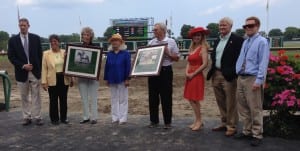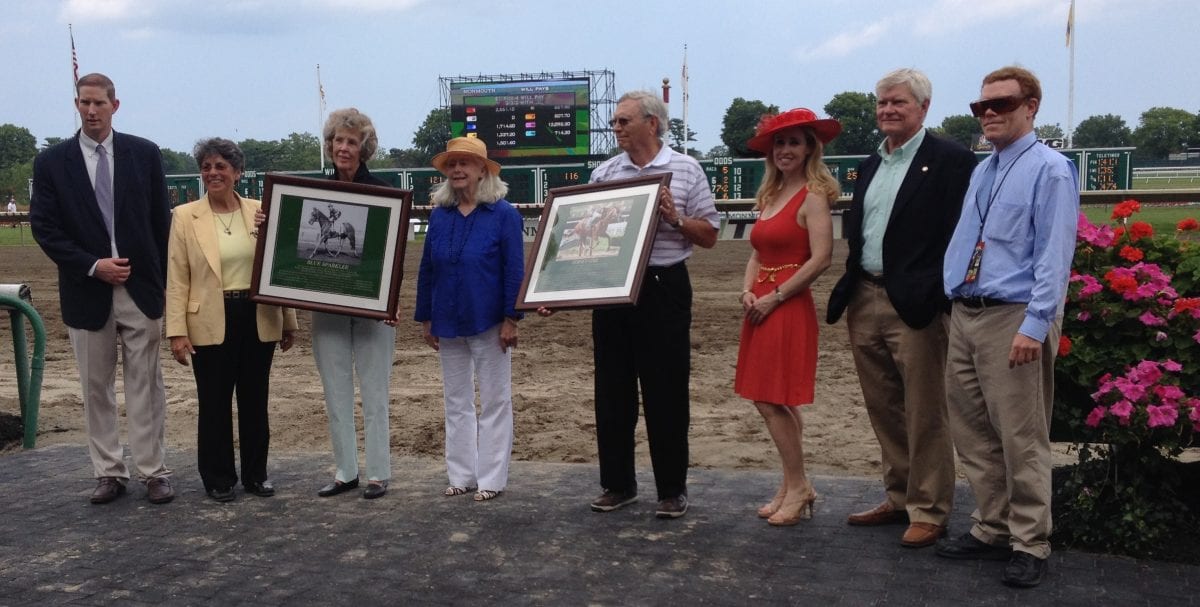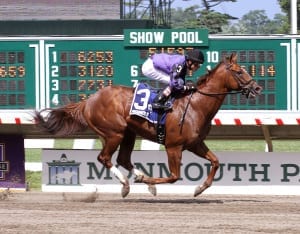by Frank Vespe
Jersey Girl won nine of 11 starts in her career, finishing it up with three consecutive Grade 1 scores, the last of those in the 1998 Test at Saratoga.
Blue Sparkler, winner of 11 races in her career, earned the Eclipse as champion older mare of 1956.
Those two entered the New Jersey-bred Hall of Fame on Sunday, in a winner’s circle presentation following Monmouth’s fifth race on the Haskell Invitational card.
Suitably inspired, Rainbow Heir, a four-year-old Jersey-bred trained by Ben Perkins, Jr. for owner-breeder New Farm, won his first stake in over a year by taking the Teddy Drone. The win neatly closed another circle; nine years earlier, Wildcat Heir, Rainbow Heir’s sire, had won this same race.
The win, Rainbow Heir’s fourth over the Monmouth strip, came nearly 13 months after his prior stakes score, in the Grade 3 Jersey Shore at Monmouth. Just two months ago, Rainbow Heir had finished fifth in a state-bred stake at Monmouth, suggesting that perhaps he wasn’t quite the horse he’d been.
But Perkins betrayed no impatience with him.
“He’s always been a nice, kind horse,” the veteran conditioner said post-race. “You just…when a horse has that kind of talent, he’d shown it before, you know it’s there. You just gotta try to do things and wait on him and hope for the best.”
On Sunday, carrying six fewer pounds than his primary rivals — hard-hitting Ribo Bobo, Diablo winner Sensational Slam, and Grade 3 Toboggan winner Candyman E — Rainbow Heir stalked the pace before drawing clear to a three-length score.
He now has six wins from 10 career starts and earnings of more than $266,000.
He doesn’t have NJ-bred Hall of Fame credentials — yet.
But someday?
“Someday, hopefully,” Perkins said. “[If he can] knock out one of the big ones, or two.”
Jersey Girl and Blue Sparkler, of course, have already knocked out all the big ones they need. Their induction increased the number of members of the Hall, in its third year, to eight.
In addition to several board members of the Thoroughbred Breeders’ Association of New Jersey,which created and administers the Hall, the selection committee this year included Monmouth’s Brad Thomas and sportswriter Bill Finley.
“Here’s what was so great about the process,” said Bob Matthies, vice president of the Association and a member of the Hall of Fame committee, “being able to sit down with our fellow board members, Mike Campbell, our executive director, but also Brad Thomas and Bill Finley and just take trips down memory lane as we looked at the past performances of these great animals.”
The Hall’s first four members — Open Mind, Regret, Cavalcade, and Henry of Navarre — were inducted in 2012. All are members of the National Museum of Racing and Hall of Fame. Missy’s Mirage and Zoffany came on board last year.
“We have some superstars right here in New Jersey and nationally known horses bred in New Jersey,” pointed out Matthies, a retired educator who is also the mayor of Seaside Park, NJ.
Matthies, a relatively new breeder, watched the first runner he’s bred, a three-year-old Gators N Bears colt named Jameson Spice, finish fifth in his debut in the day’s first race.
It was a start, and Matthies has his eyes on the prize.
“That would be my objective,” he said. “[That] someday I’ll be back here to receive the recognition of breeding a champion.”
“That’s what everybody shoots for,” agreed Mike Campbell, executive director of the Breeders’ Association.

NJ-bred Hall of Fame induction. Mike Campbell is at far left, Bob Matthies second from right. Photo by The Racing Biz.
Campbell said that the Hall serves as a way to raise public awareness of the quality of horses bred in New Jersey and also as a way to promote a state breeding industry that has “hit some tough times.”
Indeed, the number of registered New Jersey-bred foals has dropped from more than 500 in 1992 to just 168 in 2012. Most of that decline occurred after 2007, when the combination of national economic struggles and racing’s increasing dependence on slots revenue — not currently available to New Jersey tracks — hit the state hard.
Still, hope springs eternal, and the success of horses past and present reminds everyone of what is possible.
“There are still people producing very good horses [in New Jersey],” Campbell said. “I think in a few years there will be some horses that have run in the last three or four years that will certainly be considered by the committee.”
Give Rainbow Heir a couple more wins, and Ben Perkins will be happy to suggest one for the committee to consider.














